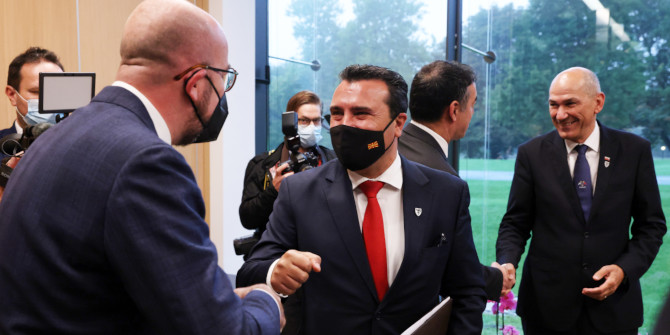 On 15 December, Theresa May travelled to Brussels for a European Council meeting. Simon Usherwood writes that although Brexit was briefly discussed, the meeting highlighted the extent to which the rest of the EU have moved on from treating the UK as an equal partner, and that the flipside of taking back control from the EU is that the EU can now no longer be controlled by the UK.
On 15 December, Theresa May travelled to Brussels for a European Council meeting. Simon Usherwood writes that although Brexit was briefly discussed, the meeting highlighted the extent to which the rest of the EU have moved on from treating the UK as an equal partner, and that the flipside of taking back control from the EU is that the EU can now no longer be controlled by the UK.

European Council meetings are tricky events. As the pre-eminent political gathering of the EU’s heads of government and state, it is the place where many big decisions are made and alliances cemented. This has been particularly so in recent years, as the Union has faced crisis after crisis. At the same time, it is a strangely intimate setting, where friendships grow as evening debate stretches deep into the night.
Thursday’s European Council demonstrated these different logics well. The meeting – one of the first to have an earlier start to avoid a late finish – dealt with managing migration in the Mediterranean, security policy, efforts to support economic growth, Cypriot negotiation, the future relationship with Ukraine and the fighting in Syria. All of these are substantial and pressing issues for the EU, even if the conclusions reached did not provide much resolution.
Importantly, the question of the UK’s departure was not a big part of proceedings. Theresa May got a short slot to set out an update on the UK, which she used mainly to underline the need to provide prompt agreement on the status of UK nationals living in the rest of the EU, and EU nationals living in the UK. After her departure at the end of the European Council, the remaining 27 leaders had a brief informal meeting, to agree a short statement setting out the process for negotiating Article 50.
However, for many in the UK, the big splash was the footage of May looking short of people to talk with before the meeting began. For Leavers it was a sign of how unpleasant the EU is to those who turn against it, while for Remainers it was evidence of the costs in influence of cutting ties. It should be remembered that May has only attended one European Council prior to this, so a degree of awkwardness might be expected.
But May’s (and the UK’s) peripheral role in proceedings tells us something much more important than whether she is matey with her counterparts. One of the key logics of European integration is that member states are able to tackle issues together that they would struggle with by themselves. Everyone brings something to the table and – through a process of negotiation, compromise and deals – everyone gets something back.
When countries don’t play ball with this process, it’s usually for a very specific reason: domestic political pressure is the most common source. Other states understand that and work to try and accommodate it where they can, although not to the detriment of the overall system. For the state with the problem, the game is to work out how the specific issue weighs up against the other benefits that it derives from membership.
The UK is in a very different place. By announcing its intention to leave, it collapses the process: by offering nothing, it should now expect nothing in return. This manifested itself very clearly in three ways at the European Council. Firstly, the EU will spend as little time as possible on the matter of Brexit. As the conclusions highlight, there is more than enough to occupy minds in Brussels and national capitals, both domestically and internationally. Thus the scope for May to wrangle a deal with other leaders will be limited to the very end of the process.
Secondly, what focus the EU does have at present is limited to process. What debate there was on Thursday over the statement concerned the role of the European Parliament: it will have to approve any Article 50 deal, and so wants to be in the room when talks happen. The concession made was an invitation to preparatory meetings and regular briefings, which might suffice, although much will depend on who takes over the Parliament’s Presidency next month.
Thirdly, the EU continues to operate as before. Those informal greetings and chats are part and parcel of the process and if May didn’t get a look in, then it is because she is no longer part of that process. The flipside of taking back control for the UK from the EU is that the EU also doesn’t have to be controlled by the UK. Expect many more awkward moments in the months and years to come.
Please read our comments policy before commenting.
Note: This article originally appeared at UK in a Changing Europe. It gives the views of the author, not the position of EUROPP – European Politics and Policy, nor of the London School of Economics.
Shortened URL for this post: http://bit.ly/2gVdNHW
_________________________________
 Simon Usherwood – University of Surrey
Simon Usherwood – University of Surrey
Simon Usherwood is Senior Lecturer in Politics at the University of Surrey and currently a Senior Fellow in the ESRC’s “UK in a Changing Europe” programme.





Do you genuinely think the UK controlled the EU? I hope not.
As the only country leaving the UK it will be isolated, that’s just a step on the way to being absent, Only those who hope this is just bad dream would expect otherwise.
The reason the 27 spent so little time on brexit as a combination of appalling time management, and that they’re a million miles from even framing a position. They are entering into a process of self harming at a time when they’re highly averse to self harm, and they have no idea to who to nominate to take one for the team. Other than a few slogans they have no agreement, nor any idea how to agree.
congratulations !!
you’ve just described the UK’s situation
too bad you were meant to talk about someone else
Another way to look at this is that the the Council is now ineffectual and swamped with more problems than it can tackle: it failed to even discuss the Italian situation. All it could manage was to sideline the oafish Verhofstadt. Perhaps they are dulled by the Juncker/Barnier line that the UK will seek to continue its membership on being faced with a Project Fear bill, and that therefore they don’t really need to even make contingency plans for anything else. They did signal an intention to control the Article 50 process, but they will find that ignoring the necessary detail will leave them being driven by the better prepared British and by the Juncker plan, which is unlikely to succeed. In Brussels they still haven’t got the message that Brexit means Brexit, and they have yet to begin deciding how to cover the financial shortfall that will result. No cherries, no money – not even a brass sou.
what truly doesn’t add up is thinking about yourself as a reasoned, enlightened intelligent being when so many contradictions and conspiracies populate your “world”,
you should really consider taking some meds off your diet, and breath some fresh air more often.